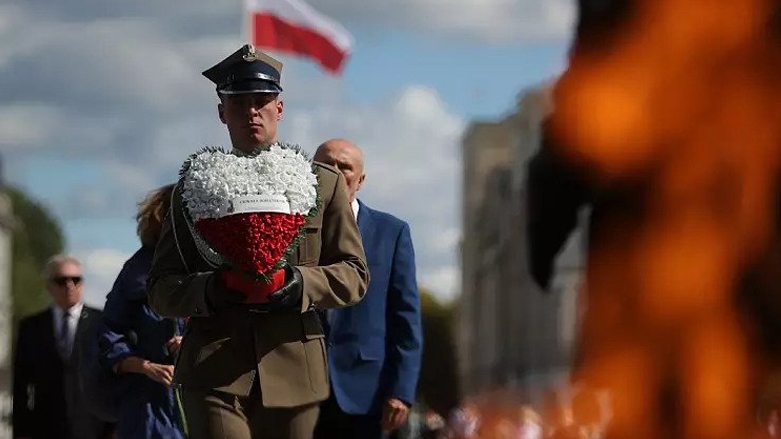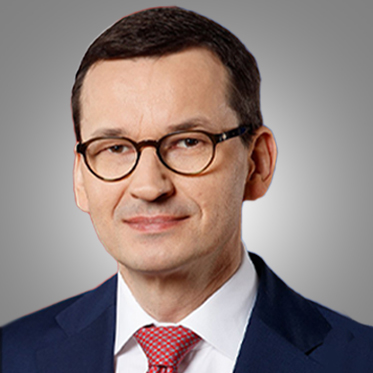It is impossible to look to the future without settling the truth about the past

There are crimes that can never be fully forgiven and can never be forgotten. Time does not absolve the perpetrator of his obligation to make amends to the victim. Even if the crimes seem difficult to quantify.
Not all Western European countries understand the full scale of the tragedy for Poland that was wrought by World War II. From a Western perspective, the conflict can be seen as a series of battles, troop movements, and political decisions. For us, it was primarily a set of crimes, atrocities, and destruction, as well as opportunities for development that have been lost forever.
From the very beginning, World War II was a cold-blooded crime planned with the goal of the physical elimination of entire nations and destruction of entire countries.
Of course, the war brought death and destruction everywhere. But in Eastern Europe, this terrible time was a hundred times worse than in France, Belgium, Holland, or Denmark. Although it is hard to imagine today, three generations ago Nazi Germany denied Poles the right to live. It regarded us as a race of slaves on whom horrific crimes and experiments could be carried out with impunity.
Racial prejudice, a sense of superiority, and the colonial ambitions of the Third Reich led to the greatest tragedy in the history of my country. They dashed the chances and hopes of an entire nation.
Poland is still reeling from the effects of this war today. And it will continue to struggle with them long after the last eyewitnesses of that inhumane time are gone.
According to the German Generalplan Ost, Poles were to be mostly exterminated, and the small portion left alive was to be reduced to the role of slaves - a coerced workforce. This criminal plan was implemented from the very first day of World War II. Even the first bombs, which fell on Poland at 4:40 a.m. on September 1, 1939, were not aimed at military facilities, but at the hospital and residential buildings of the defenseless town of Wieluń. The Germans dropped 380 bombs weighing a total of 46 tons on the quiet, sleeping town. It was a sadistic, horrific genocide.
As early as the first days of the war, the Wehrmacht and auxiliary units consisting of ordinary Germans burned defenseless children and women alive.
In a famous photo from September 1939, American photographer Julien Bryan captured a 12-year-old Polish girl, Kazimiera Kostewicz, grieving over the body of her not much older sister Anna, who was shot by a German soldier.
There were millions of such children in Poland, mourning their parents, siblings, and friends. At the same time, millions of parents were mourning their own children because of the war. It was a hellish slaughter - and a slaughter that the Germans carried out largely on ordinary, innocent civilians.
The reality of Poland under German occupation consisted of constant crimes, massacres of civilians, gigantic looting of Polish property, the theft of more than 500,000 paintings, sculptures and other works of art. Somewhere in a German house or mansion, Rafael Santi's "Portrait of a Young Man" hangs to this day.
The reality of Poland under German captivity was the turning of entire cities into rubble, the destruction of cultural and religious sites, roundups in the streets, show executions, medical experiments on prisoners and captives, and the kidnapping of children from their parents (at least 200,000 children were kidnapped in this way) and sending them deep into the Reich for "Germanization." Finally - the construction on Polish soil of a terrible death machine: the concentration camp.
The criminal acts of violence were planned in detail, and they also had names: Intelligenzaktion, Sonderaktion, or Außerordentliche Befriedungsaktion. These were all organized operations that the Germans directed against the elite of the Polish nation - professors, lawyers, doctors, engineers, teachers, and architects. In Operation Tannenberg alone, in the first months of the war, the Germans murdered some 55,000 Polish citizens, including officials of all levels, local activists, teachers, policemen, and representatives of many other professions important to the organization of the state. During the six years, more than 5.2 million citizens of my country were murdered, and the population was reduced by about 12 million.
By the end of the war, Poland had a completely ruined economy, destroyed industry, and its cities were razed to the ground.
And what happened to those who waged terror in Poland all this time? Often they became local elites in post-war West Germany and lived in affluence, avoiding any responsibility for the crimes they committed. Such as Heinz Reinefahrt, one of the executioners of the Warsaw Uprising, who after the war became mayor of the town of Westerland on the famous island of Sylt, and later became a member of the Landtag in Schleswig-Holstein. Heinz Reinefarth is just one of countless examples of how World War II really ended; in great injustice. That's right, the bloodiest war in world history was never fully called to account.
That is why today we raise the issue of reparations, the issue of compensation for German crimes against the Polish people and Polish citizens. Crimes that must never be forgotten. With justice and the good name of the victims at heart, we have prepared the Report on the losses suffered by Poland as a result of German aggression and occupation during World War II 1939-1945. This 3-volume report is the result of more than 4 years of work by a specially appointed team of experts. It is an account of Poland’s stolen future.
The lesson we should learn from World War II is that crimes that go unremembered, unnamed, unjudged, and unpunished can only be a harbinger of more to come. After all, war crimes are happening today before the eyes of all of Europe - they are being carried out by Russian troops on the Ukrainian people. Today's barbarians must know that they will not escape responsibility for their crimes - genocide, destruction, and looting. They must be aware that justice will inevitably reach them.
Germany has for many years taken the position that the subject of war reparations was settled long ago. And yet it was only recently that Germany decided to compensate the Herero and Nama ethnic groups for the genocide in Namibia over a century ago. After almost 50 years, Germany also agreed to pay reparations to the families of victims of the terrorist attacks on Israeli athletes during the Munich Olympics. It doesn't matter whether 10, 50, or 100 years have passed since the crimes. What matters is whether they have been truly accounted for.
Any debate about reparations must also take into account these gestures by the German authorities. The victims of Germany's totalitarian war machine deserve not only the same respect and remembrance as the victims of colonialism or terrorism. The unimaginable scale of the destruction inflicted on Poland between 1939 and 1945 makes reparations for losses a process that stretches over years.
After World War II, we say "never again" every year, and yet reparations for the Polish people never became a reality. In an existential sense, these losses cannot be valued or compensated. After all, who is capable of estimating the price of human life? This is where only history can judge the perpetrators. However, there is also the responsibility of societies and states. This responsibility certainly can be measured and counted. We believe that this responsibility for the wrongs committed is the foundation for building a common future between nations. It is impossible to look to the future without settling the truth about the past. We must and want to move on. But the only path that leads us forward is the path of truth. I hope that this is the path we are embarking on. I hope that in this way we can close one of the darkest chapters in the history of Poland, Europe, and the world.
***The views expressed in this article are those of the author and do not necessarily reflect the views of Kurdistan 24.
